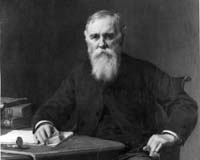This is an old revision of this page, as edited by 81.106.115.153 (talk) at 17:35, 5 March 2010 (→Influence on legal teaching: Removed P.O.V material that is clearly contradicted by historical evidence.). The present address (URL) is a permanent link to this revision, which may differ significantly from the current revision.
Revision as of 17:35, 5 March 2010 by 81.106.115.153 (talk) (→Influence on legal teaching: Removed P.O.V material that is clearly contradicted by historical evidence.)(diff) ← Previous revision | Latest revision (diff) | Newer revision → (diff)
Christopher Columbus Langdell (May 22, 1826 - July 6, 1906), American jurist, was born in the town of New Boston, New Hampshire, of English and Scots-Irish ancestry. He has been widely credited as the creator of the classical and orthodox theory of American jurisprudence.
At the essence of Langdell's legacy is his influence on the teaching of law. Before Langdell's tenure the study of law was a technical pursuit. Students were told what the law is. However, at Harvard Langdell applied the principles of pragmatism to the study of law. Now, as a result of this innovation, lawyers are taught the law through a dialectical process of inference called the case method. The case method has been the primary method of pedagogy at American law schools ever since. Students such as Oliver Wendell Holmes, Jr. would ensure that Langdell's innovation would not go unnoticed.
Life
He studied at Phillips Exeter Academy in 1845-1848, at Harvard College in 1848-1850 and at Harvard Law School in 1851-1854. From 1854 to 1870 he practiced law in New York City, but was almost unknown when, in January 1870, he was appointed Dane Professor of Law at Harvard Law School. Soon after, he became Dean of the Law Faculty, succeeding Theophilus Parsons, to whose Treatise on the Law of Contracts (1853) he had contributed as a student.
He resigned the deanship in 1895, in 1900 became Dane Professor emeritus, and on 6 July 1906 died in Cambridge. He received the degree of LL.D. in 1875; in 1903 a chair in the law school was named in his honor; and after his death one of the school's buildings was named Langdell Hall.
Christopher Langdell made the Harvard Law School a success by remodeling its administration. In a private correspondence of 13 April 1915, Charles Eliot wrote: "the putting of Langdell in charge of the Law School was the best piece of work I did for Harvard University, except the reconstruction of the Medical school in 70 and 71, and the long fight for the development of the elective system."
Influence on legal teaching
| This article or section appears to contradict itself. Please see the talk page for more information. |
| This article may have misleading content. Please help clarify the content. |
Dean Langdell's greatest innovation was his introduction of the case method of instruction. Until 1890, no other U.S. law school used this method, which is now standard.Moreover, the standard first-year curriculum at all American law schools — Contracts, Property, Torts, Criminal Law, and Civil Procedure — stands, mostly unchanged, from the curriculum Langdell instituted.
The basic thesis of Langdellianism is that law is a science, akin to the natural sciences, and that the relevant data set for the science of law are cases. From proper selection of the specimen cases, the legal scientist could derive the few, general fundamental legal principles that exist through inductive reasoning. The legal principles so derived functioned as the constituent ontological units within the construct. From them, through the rigorous and almost Cartesian application of logic and deductive reasoning, a series of clear specific rules would be derived that would govern any given case. The specific rules themselves were formalistic in conception, meaning that they were framed in a manner that made their application uncontroversial when applied to stipulated facts. The rules would then be the bases of decision-making in future cases.
Langdell, who came from a relatively unknown family, was conscious of the fact that students from more privileged backgrounds often received higher grades in their coursework purely because of their family's wealth and social status. Dean Langdell instituted the process of blind grading, now common at U.S. law schools, so that students already known by professors or from esteemed families would have no advantage over others.
Works
- Selection of Cases on the Law of Contracts (1871, the first book used in the case system; enlarged, 1877)
- Cases on Sales (1872)
- Summary of Equity Pleading (1877, 2nd ed., 1883)
- Cases in Equity Pleading (1883)
- Brief Survey of Equity Jurisdiction (1905)
References
- Hamoudi, Haider Ala: Muhammad’s Social Justice or Muslim Cant?: Langdellianism and the Failures of Islamic Finance, Cornell International Law Journal, vol. 40.1 (2007), p.98
- Letter to Henry S. Pritchett, Correspondence of Charles W. Eliot, Small Manuscript Collection, Harvard Law School Library. Cited by Kimball (1999).
- Hamoudi, Haider Ala: Muhammad’s Social Justice or Muslim Cant?: Langdellianism and the Failures of Islamic Finance, Cornell International Law Journal, vol. 40.1 (2007), p.98
 Chisholm, Hugh, ed. (1911). Encyclopædia Britannica (11th ed.). Cambridge University Press.
Chisholm, Hugh, ed. (1911). Encyclopædia Britannica (11th ed.). Cambridge University Press. {{cite encyclopedia}}: Missing or empty|title=(help)